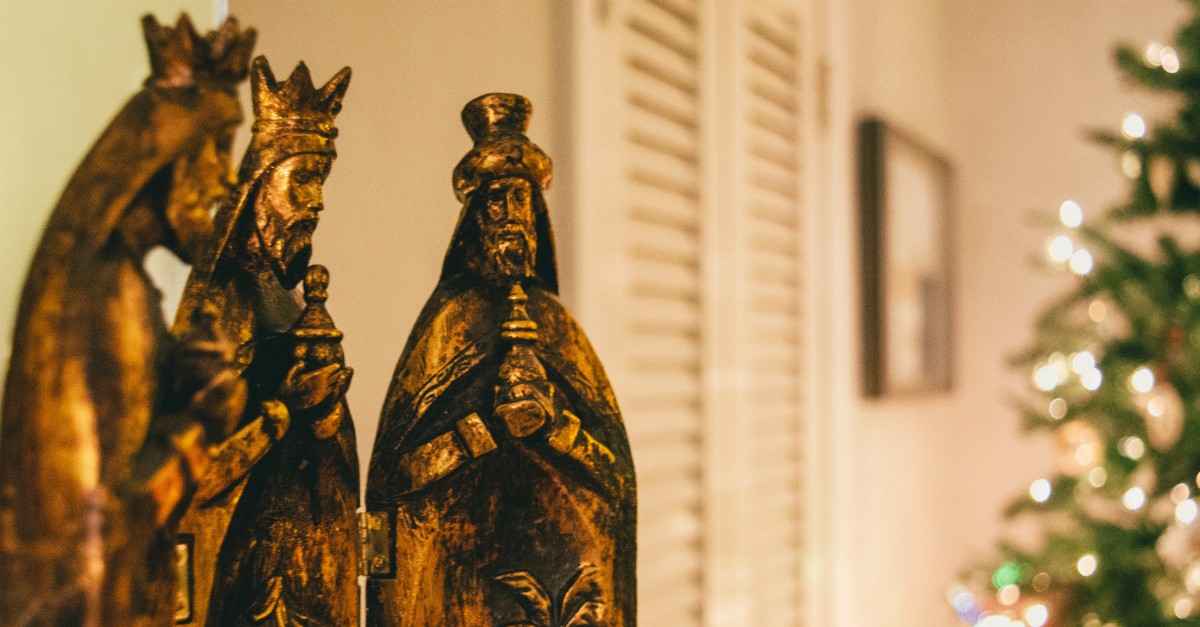Why Did God Choose Wonderfully Ordinary People during Christmas?
Slideshows


Audio By Carbonatix
By Britt Mooney, Crosswalk.com
God loves to use ordinary, everyday people to do participate in his supernatural and epic story. Time and again through the Scripture, God calls the unlikely or broken to join him in his redemptive plan. Whether an old man like Abraham or a shepherd boy like David, God chooses people others wouldn’t.
He does this for several reasons but mostly to prove his power and glory. Within expressing his supremacy and might, God also teaches us important truths about himself and us through wonderfully ordinary people.
The Christmas narrative is no different. God used the foreign nearby neighbors and marginalized as supporting characters when he brought his Son into the world to save us all.
Here are six examples of why God chose wonderfully ordinary people during Christmas.
Photo Credit: ©Unsplash/Nick Fewings

1. Why Can God Work through Anyone?
God’s ability to use people doesn’t depend upon our resume, good or bad. When God changes our story, bringing us into his eternal purpose, he empowers us, and our lives reflect his promise and transformation. Therefore, since it depends upon him, God can use anyone.
Mary, a humble young woman from Nazareth, became the mother of Jesus, the savior of the world. She didn’t hail from a wealthy or influential family. As a Jew, she had second class citizenship under Rome. Unmarried and young, she had little to no status in the Jewish culture. Yet, God saw her heart and chose her to fulfill one of the most important roles in history.
The angel Gabriel appeared to Mary and said, “Greetings, you who are highly favored! The Lord is with you.” (Luke 1:28). In many ways, Mary probably didn’t feel highly favored. On the contrary, she appeared to be insignificant by worldly standards. However, Mary willingly said “yes” to God’s plan despite the coming hardships, and God’s choice shows us it’s not about social status, education, or personal accomplishments. Faith draws God near and pleases him.
Further, God values humility and obedience over fame or earthly power. His work doesn’t depend on human strength but on his own grace. This Christmas, we can be encouraged. No matter our background, God has a purpose for each of us in his grand plan.
Photo Credit: ©Getty Images/Studio-Annika

2. How Do Faith and Obedience Make Us Part of God’s Plan?
When God speaks to people, he calls them toward action. First, he reveals his grace and mercy, engaging and revealing his glory. God’s revelation leads to transformation, a change of behavior and purpose.
The shepherds, humble men watching over flocks at night, were among the first to receive news of Jesus’ birth. God could have opened the heavens to kings or religious leaders, but instead, the angelic host shared the news with everyday people living simple lives. God entrusted them with the Gospel, the birth of Christ.
The shepherds were initially terrified when the angels appeared, but one angel reassured them: “Do not be afraid. I bring you good news that will cause great joy for all the people.” (Luke 2:10). The shepherds didn’t hesitate before responding in faith. They said to each other, “Let’s go to Bethlehem and see this thing that has happened, which the Lord has told us about.” (Luke 2:15)
Through choosing the shepherds, God shows us how he values faith and action over status or intelligence. The shepherds may have been marginalized people, lonely in a field, but their faith in the Good News and subsequent obedience made them part of God's coming to earth for salvation. These shepherds inspire us to listen to God and follow his lead, no matter how simple or insignificant our lives may seem.
Photo Credit: ©iStock/Getty Images Plus/ChrisGorgio

3. How Does God’s Choice of the Magi Show His Love for All?
God first chose to reveal himself to and through a special people, the Jews. They weren’t intrinsically superior or inferior, but they became the nation through which God made himself known. However, all humanity has been created in his image, and he promised to bless all nations, not just one. The Gospel arrived for all people.
The Magi, sometimes referred to as “wise men,” were Gentiles from the East, likely academics or astrologers. They followed the star to find the baby King of the Jews, the Messiah. Despite their pagan and non-Jewish origins, God used them to demonstrate how Christ came for all nations.
When the Magi saw the star, they noted its uniqueness and prophetic meaning. They set out on a long journey, showing their hunger and dedication to the truth. Upon reaching Jesus, they bowed down and worshipped him, giving the child gifts of gold, frankincense, and myrrh (Matthew 2:11). The Gospel extends beyond cultural, ethnic, or national boundaries. All people live in this broken world, and we long for a better kingdom, a loving and righteous rule, and reign. From his abundant love, God sent his son for the whole world to be saved from death and enjoy eternal life.
God’s choice of the Magi reminds us to look beyond the outward appearance or background to share the Good News of Jesus with all people everywhere.
Photo Credit: Unsplash/Jonathan Meyer

4. How Does Elizabeth’s Story Prove No Life Is beyond God’s Reach?
Many people feel stuck, as if their lives have been wasted and there’s no hope for a good and fruitful future. But God can bring life from the dead, something from nothing. And it’s never too late for God to work miracles.
Elizabeth, an old and barren woman, had long lived under the social stigma of being childless. The Jewish culture associated children with God’s blessing and favor. Therefore, to be married and barren became a sign of shame. However, God chose her to become the mother of John the Baptist, the forerunner to Jesus. God’s intervention shows how he raises up the humble and marginalized, turning shame into a blessing.
The angel Gabriel appeared to Elizabeth’s husband, Zechariah, and announced how Elizabeth would bear a son who would “bring back many of the people of Israel to the Lord their God.” (Luke 1:16). Her age and barrenness proved no obstacle to God. The Lord worked a miracle in her life, showing us how no situation is too hopeless for God’s redemption. Elizabeth’s story connects with a broader theme throughout the Bible and the Christmas story. God consistently shows favor to the humble and overlooked. He especially delights in raising up the lowly and using them for his mission.
Elizabeth reminds us that no one is beyond his reach or help. In fact, when we struggle with feeling abandoned or overlooked, God seeks to transform our lives and bring glory to himself.
Photo Credit: ©iStock/Getty Images Plus/Eva-Foreman

5. How Does Zechariah’s Story Show God Works beyond Human Strength?
Some may feel wasted or unworthy. Others may place too much confidence in their own ability. Nothing good happens apart from God’s work and power, and he must often humble us to teach this.
Zechariah was a priest who was married to Elizabeth, and they were both too old to have children. Despite their grief, they stayed faithful to God. Zechariah had the honor of serving in the temple, and there, in the sanctuary, the angel Gabriel appeared and announced Elizabeth would bear a son. But Zechariah questioned the angel. “How can I be sure of this? I am an old man, and my wife is well along in years.” (Luke 1:18). Zechariah paid more attention to his weakness and lack of ability (being too old) instead of the angel’s message. He doubted God. For this, Gabriel said, “Now you will be silent and not able to speak until the day this happens because you did not believe my words.” (Luke 1:20)
God’s plans won’t be fulfilled through human ability. Neither will inability keep them from being fulfilled. God works through his own power, not ours. Zechariah’s temporary loss of speech became a sign of how we must depend upon God alone. When the promised son was born, Zechariah wrote the name God gave him. “His name is John.” (Luke 1:63-64) Immediately, Zechariah could talk again, and he first praised God.
God works through ordinary people who depend on an extraordinary God rather than their own strength. Zechariah teaches us to trust in God’s promises and power to fulfill them.
Photo Credit: Getty Images/Marinela Malcheva

6. How Does Joseph’s Story Show the Power of Trusting God’s Plan?
From the beginning, God had a plan. When Adam and Eve disobeyed in the Garden of Eden and received the consequence of death, God prophesied redemption through a son. As we’ve pointed out, God’s power accomplishes his plan. This means we can trust his plan.
A simple carpenter, Joseph was engaged to Mary when he learned about her pregnancy, not by him but by the Holy Spirit. Confused and probably hurt, Joseph first tried to “put her away” quietly so as to not publicly shame her. But an angel appeared to him in a dream and explained she remained a virgin. God had miraculously given her a child. The angel said, “Do not be afraid to take Mary home as your wife, because what is conceived in her is from the Holy Spirit.” (Matthew 1:20). Joseph decided to trust God’s plan despite the public stigma they might face.
Joseph married Mary and became an earthly father to Jesus, showing us his willingness to follow God’s greater purpose. Later, after Jesus was born, Joseph’s trust was tested again when an angel warned him to flee to Egypt to escape Herod’s murderous attempt to kill Jesus. Joseph obeyed, leaving for Egypt with his family (Matthew 2:13-14). Joseph’s quiet and incredibly brave faithfulness instructs us to rely upon and participate in God’s plan, no matter how surprising, knowing God leads us to goodness and reward.
Photo Credit: ©GettyImages/jchizhe


























